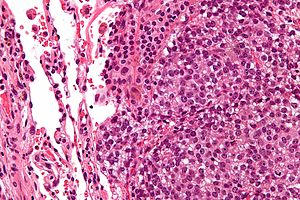Small round cell tumours
Jump to navigation
Jump to search
Small round cell tumours (SRCT), also small round blue cell tumours (SRBCT), are a group of tumours that have a similar histologic appearance.
General
- Group of tumours that is typically seen in childhood and younger adults.
- Most common small round cell tumour is non-Hodgkin lymphoma.[1]
A short differential diagnosis of small round cell tumours
- Neuroblastoma.
- Wilms tumour (AKA nephroblastoma).
- Alveolar rhabdomyosarcoma.
- Ewing sarcoma / primative neuroectodermal tumour (PNET).
- Lymphoma - non-Hogkin's lymphoma, usu. large cell lymphomas (e.g. diffuse large B cell lymphoma, anaplastic large cell lymphoma), Burkitt's lymphoma.
- Retinoblastoma.
- Hepatoblastoma.
- Desmoplastic small round cell tumour (DSRCT).
- Small cell carcinoma.
Others:
Memory device: 4 -blastomas (hepato-, neuro-, nephro-, retino-), PNET/Ewing sarcoma (medulloblastoma), LADSSS (lymphoma, alveolar rhabdomyosarcoma, DSRCT, small cell carcinoma, small cell osteosarcoma, synovial sarcoma).
A long differential diagnosis of small blue cell tumours
Adapted from Miller with modifications:[4]
Notes:
- This DDx includes small cells that may be spindled.
- The DDx for large (non-pleomorphic) epithelioid cells is found in large epithelioid tumours.
Microscopic
Features:
Tabular comparison
Adapted from Thorner:[9]
| Tumour | Key histologic features | History | Key IHC / special stains |
|---|---|---|---|
| Hepatoblastoma | fetal hepatocytes (~ 1:3 NC ratio, eosinophilic cytoplasm) | liver lesion, usu. < 3 years old | AFP |
| Neuroblastoma | nests, thin fibrovascular septae, lymphocytes, ganglion-like cells (prominent nucleolus), neuropil (eosinophilic, fluffy, finely vacuolated) | adrenal gland, sympathetic chain; usu. < 3 years old | NB-84+, NSE+, S100- |
| Nephroblastoma (Wilms tumour) | triphasic - (1) blue cells (blastema), (2) spindle cells (stroma), (3) tubular structures (epithelial) | kidney lesion, various syndromes (e.g. Beckwith-Wiedemann syndrome[10]) | WT-1+ |
| Retinoblastoma | Flexner-Wintersteiner rosette (rosette with empty centre (donut hole))[11] | eye lesion; +/-RB1 gene mutations (familial) | |
| Medulloblastoma | Homer-Wright rosettes (rosette with a meshwork of fibers (neuropil) at the centre)[11] | +/-nevoid basal cell carcinoma syndrome; must arise in cerebellum | |
| Ewing sarcoma/PNET | clear cytoplasm (glycogen) | bone lesion, adolescents | PAS+/PASD-, CD99 diffuse membranous |
| Alveolar rhabdomyosarcoma | alveolar-like spaces (small blue cells line spaces supported by fibrous tissue), rhabdomyoblasts (eosinophilic cytoplasm, +/-cross striations (uncommon), eccentric nucleus, +/-elongated/cigar-shaped cells (uncommon)) | adolescents, young adults; often mets at presentation | "DAM" = desmin, actin, myogenin |
| Embryonal rhabdomyosarcoma§ | nests with rounded border, rhabdomyoblasts (+/-elongated/cigar-shaped cells, eosinophilic cytoplasm, +/-cross striations, eccentric nucleus) | <10 years old; usu. localized | "DAM" = desmin, actin, myogenin |
| Desmoplastic small round cell tumour (DSRCT) | nests with "jigsaw" border | peritoneum (abdomen or plevis); male > female; locally invasive | keratin+, EMA+, desmin+ !!! |
| Small cell carcinoma | nuclear moulding, stippled chromatin | adults, smokers | synaptophysin, chromogranin A, CD56, keratins |
| Lymphoma, non-Hogkin's, usu. large cell (e.g. DLBCL) | dyscohesive cells, usu. ~2x normal (resting) lymphocyte, usu. nucleolus | usu. lymphadenopathy | CD45, CD20, TdT, CD3 |
Notes:
- § Uncommonly has the small round cell tumour morphology - included for comparison to alveolar rhabdomyosarcoma.
IHC panel
Gino's panel:[12]
| Lesion | NB84 | Myogenin | Desmin | CD99 | CD45 |
|---|---|---|---|---|---|
| Lymphoma | -ve | -ve | -ve | +ve/-ve | + |
| Ewing sarcoma | +ve/-ve | -ve | -ve | +ve (membranous) | - |
| Neuroblastoma | +ve | -ve | -ve | +ve/-ve | -ve |
| Rhabdomyosarcoma | -ve | +ve | +ve | -ve | -ve |
More general panel:[1]
- CD45, CD20, CD3, CD99, desmin, EMA, pankeratin, synaptophysin, chromogranin, GFAP.
See also
References
- ↑ 1.0 1.1 D'cruze, L.; Dutta, R.; Rao, S.; R, A.; Varadarajan, S.; Kuruvilla, S. (Jul 2013). "The role of immunohistochemistry in the analysis of the spectrum of small round cell tumours at a tertiary care centre.". J Clin Diagn Res 7 (7): 1377-82. doi:10.7860/JCDR/2013/5127.3132. PMID 23998069.
- ↑ URL: http://www.thedoctorsdoctor.com/diseases/small_round_blue_cell_tumor.htm. Accessed on: 2 July 2010.
- ↑ Chen QR, Vansant G, Oades K, et al. (February 2007). "Diagnosis of the small round blue cell tumors using multiplex polymerase chain reaction". J Mol Diagn 9 (1): 80–8. doi:10.2353/jmoldx.2007.060111. PMC 1867426. PMID 17251339. https://www.ncbi.nlm.nih.gov/pmc/articles/PMC1867426/.
- ↑ Miller RT. (Sep 2013). Atlantic Diagnostic Immunohistochemistry Symposium. St. John's, NL, Canada.
- ↑ Mayall, FG.; Gibbs, AR. (Jan 1992). "The histology and immunohistochemistry of small cell mesothelioma.". Histopathology 20 (1): 47-51. PMID 1310669.
- ↑ Kutzner, H.; Mentzel, T.; Kaddu, S.; Soares, LM.; Sangueza, OP.; Requena, L. (Mar 2001). "Cutaneous myoepithelioma: an under-recognized cutaneous neoplasm composed of myoepithelial cells.". Am J Surg Pathol 25 (3): 348-55. PMID 11224605.
- ↑ Reichard, KK.; Burks, EJ.; Foucar, MK.; Wilson, CS.; Viswanatha, DS.; Hozier, JC.; Larson, RS. (Oct 2005). "CD4(+) CD56(+) lineage-negative malignancies are rare tumors of plasmacytoid dendritic cells.". Am J Surg Pathol 29 (10): 1274-83. PMID 16160468.
- ↑ Guillou, L.; Coquet, M.; Chaubert, P.; Coindre, JM. (Aug 1998). "Skeletal muscle regeneration mimicking rhabdomyosarcoma: a potential diagnostic pitfall.". Histopathology 33 (2): 136-44. PMID 9762546.
- ↑ PST. 14 February 2011.
- ↑ URL: http://www.ncbi.nlm.nih.gov/pubmedhealth/PMH0002168/. Accessed on: 4 April 2011.
- ↑ 11.0 11.1 Wippold FJ, Perry A (March 2006). "Neuropathology for the neuroradiologist: rosettes and pseudorosettes". AJNR Am J Neuroradiol 27 (3): 488–92. PMID 16551982.
- ↑ G. Somers. 22 March 2011.
